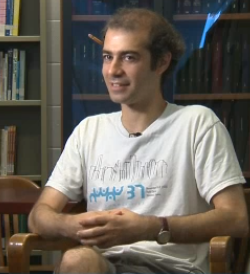Manning's pronouns
Bradley Manning, just recently sentenced for leaking classified documents to Wikileaks, has released a statement announcing, "I am Chelsea Manning. I am a female." Manning also gave instructions on his-now-her preferred personal pronouns:
I hope that you will support me in this transition. I also request that, starting today, you refer to me by my new name and use the feminine pronoun (except in official mail to the confinement facility).
News organizations are struggling today with the pronominal quandary in reporting on Manning's new transgender identity. On Slate's XX Factor blog, Amanda Marcotte writes:
The transition is already awkward. Earlier today, the New York Times headline on a Reuters story on Manning's announcement danced around gender pronouns: "Manning Says Is Female and Wants to Live as a Woman." Clearing up the grammar for an updated headline just made the situation worse: "Manning Says He Is Female and Wants to Lives as a Woman." Well, if "he" is female, then isn't the word "she"? Manning has finally had a chance to express her gender preferences. Since most journalists had a notion this was coming, using confusion or surprise as an excuse for those headlines isn't an option.
Read the rest of this entry »




